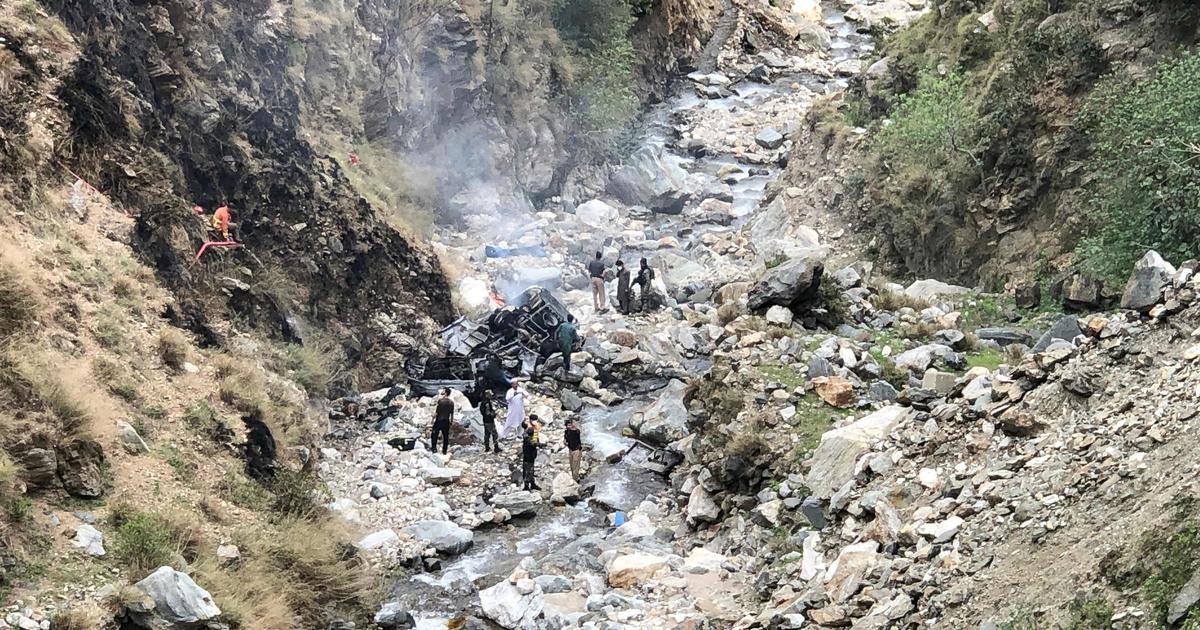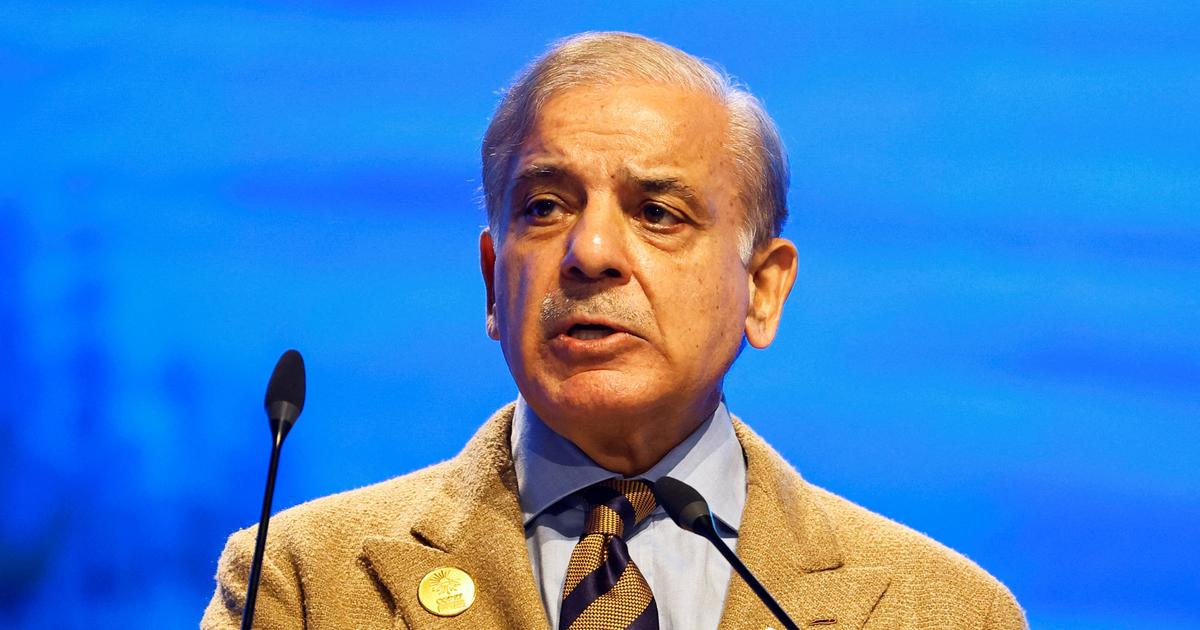China is demanding that the Taliban act against terrorist groups.
Beijing fears the infiltration of Uyghur fighters in Xinjiang.
Most of the attacks against the Chinese have taken place in Pakistan.
Beijing / Islamabad / Kabul / Munich - China never tires of warning of terrorist attacks in the conflict region around Afghanistan. At every opportunity *, Beijing's foreign politicians are calling on the victorious Taliban not to give shelter to Islamist terrorist groups. The concern is justified. Attacks on the Chinese and projects on the New Silk Road * in Afghanistan's neighboring country Pakistan have recently increased. In July, nine Chinese engineers were killed in an attack on a bus there. And other states are also warning that the state in the Hindu Kush will again become a refuge for terrorists, including al-Qaeda - as it did under the first Taliban rule in 1996-2001.
In public, China's * diplomats speak primarily of the Uyghur terrorist group
East Turkestan Islamic Movement
(ETIM), which is supposed to operate in Afghanistan. Another group called the
Turkestan Islamic Party
(TIP) emerged from this. Beijing demands that the Taliban take action against these groups who want to establish a Uighur state in northwest China's Xinjiang region. The Chinese Communist Party rules there with a hard hand and is said to have interned hundreds of thousands of Muslim Uyghurs in re-education camps in order to assimilate them.
But the situation for Beijing is currently worse in Pakistan. Its porous border with Afghanistan lies in impassable terrain; it is difficult to control, and for centuries the populations living on both sides have moved back and forth quite naturally, as if the border that was drawn at the end of the colonial era didn't even exist. There are also terrorists among these: Al Qaeda chief Osama Bin Laden initially had his refuge in the region after 2001. Pakistan is one of China's closest allies, where the China Pakistan Economic Corridor (CPEC) is one of the key projects of the New Silk Road, with many infrastructure projects down to the port of Gwadar on the Indian Ocean. Chinese companies and their employees are also active there everywhere.China's Foreign Minister Wang Yi wants to coordinate Afghanistan policy with his Pakistani counterpart Shah Mahmood Qureshi.
Pakistan: China in the crosshairs of separatist terrorist groups
But in Pakistan, China is in the crosshairs of local militant groups, and the frequency of their attacks on Chinese and investment projects in the country is increasing.
Attackers range from Pakistani separatists from the border regions of Balochistan and Sindh to Islamist jihad groups such as the local Taliban offshoot Tehrik-i-Taliban Pakistan (TTP).
This year alone there have been four attacks on prominent Chinese targets.
Nine Chinese engineers were killed in the most deadly attack to date in July: an assassin blew up a bus carrying Chinese contract workers near the Dasu Dam - a Silk Road project in the Khyber Pakhtunkhwa province bordering Afghanistan. It is still unclear who is behind the attack, which Pakistan initially tried to declare as an accident. “Normally someone would have to admit to such a 'successful' attack,” Raffaello Pantucci from the defense think tank Royal United Services Institute in London told Merkur.de *. The matter is opaque, there is not even information about the assassin, whose body the Pakistani police must have examined. "I am sure that the Chinese side is already doing its own research," says Pantucci.
Pakistan: Separatist attacks on China because it is allied with Islamabad
The series of attacks reveals the Pakistani government's weakness: it cannot even protect its close ally. The Balochist Liberation Army (BLA) has already attacked Chinese targets several times, in 2018 even the consulate in Pakistan's largest metropolis, Karachi. Most recently there was a BLA attack on a Chinese convoy near the Gwadar Silk Road port project in August. The BLA claims to have killed six Chinese and three security guards in the process - while China speaks of several injured and one Pakistani child killed. The use of a suicide bomber was worrying and new, says Pantucci. That belongs more to the arsenal of Islamist terrorists and is rather unusual for separatists.Since December 2020, Chinese had been shot at by other separatist groups several times, most recently shortly after the Gwadar attack.
"The separatist groups from Sindh and Balochistan perceive China as a neo-colonial power that grabs its raw materials and unites with its main adversary: the Pakistani state," wrote Pantucci recently together with terrorist Abdul Basit from Nanyang Technological University in Singapore in the US -Magazine
Foreign Policy
. For example, the BLA confession letter after the attack in Karachi accused China of exploitation “in the guise of development projects”. Many people in the border regions live in dire poverty and receive little support from the state. "And China is building Silk Road projects through their regions with the Pakistani government, but the people there do not benefit from them," says Pantucci in an interview.
The expert emphasizes that China is embroiled in a domestic political problem in Pakistan.
There is little that China can do about it.
So it concentrates on getting intelligence information about the groups concerned in Pakistan itself and also in Afghanistan in order to negotiate with them directly - bypassing the government.
"I have heard rumors that China has made contact with these groups - and I am sure that Pakistan is also aware of these rumors," says Pantucci.
One should not be amused in Islamabad about this.
China: Increasingly also a target of militant jihadists
However, the government and the Pakistani secret service helped to create the problem themselves. Pakistan had allowed the Afghan Taliban to operate on Pakistani territory for years - and thus indirectly boosted its own Islamists, including a local group of radical Taliban fighters (Tehrik-e-Taliban Pakistan, TTP). China's ambassador to Pakistan, Nong Rong, narrowly escaped an attack by the TTP in a hotel in Quetta in April.
The TPP are among the Islamic jihadists - and they too are increasingly targeting China. On the one hand, this is due to the fact that China, as a rising major power, is becoming more active in global geopolitics - and thus more visible. With the withdrawal of the western protective powers from Afghanistan, other powers will in future exercise their influence in the conflict region *: Russia, Pakistan, India or Iran - and above all China. Added to this is the suppression of the Muslim Uyghur minority in Xinjiang by Beijing, which is a thorn in the side of Islamic terrorist groups. According to a recent report by the UN Security Council, the Uyghur ETIM in Afghanistan, which has also been classified as a terrorist group by the USA for many years, consists of a few hundred fighters spread across four provinces. How active these fighters are and how dangerousis unclear.
Xinjiang: China fears terrorist groups ETIM and TIP
China fears an infiltration of ETIM and TIP into Xinjiang *.
Demanding that the Taliban no longer support these groups was therefore one of the conditions China placed on the Taliban from the outset to normalize relations *.
The Taliban always promise that their country will not become a haven for terrorists and that Afghanistan should not be used for fighting against other states.
Taliban spokesman Suhail Shaheen emphasized a few days ago in an interview with the Chinese state newspaper
Global Times
that this is why many ETIM fighters left Afghanistan.
Shaheen made three promises: “Firstly, we will not allow any training on our territory.
Second, we will not allow groups with an agenda abroad to raise funds here.
Third, we will not allow recruitment centers to be set up in Afghanistan.
Those are the most important things. "
+
Wang Yi and Mullah Abdul Ghani Baradar: China and the Taliban are not natural allies - but they talk to each other anyway.
© Li Ran / Xinhua / dpa
"We hope that the Afghan Taliban * keep their promises that ETIM and other terrorist organizations can break with and take effective measures to fight them vigorously," said Foreign Ministry spokesman Zhao Lijian the day after the interview. China is open to realpolitical dealings with the Taliban *, but remains suspicious.
"The Taliban say the same thing to everyone," says Pantucci. But so far there have been no reports of specific campaigns against terrorist groups on the ground. “Why should I?” Says Pantucci. Many of these terrorist groups fought with the Taliban for years. Now the Taliban have won - and should they turn against their former allies just because other states want it? Pantucci thinks this is implausible. Uyghur ETIM fighters also fought alongside the Taliban. “The previous government in Afghanistan hated ETIM because of it,” says Pantucci. Shaheen avoided the question of a possible extradition of wanted ETIM terrorists to China. Troubled times are
ahead
- and that also applies to China (ck) *
Merkur.de is an offer from IPPEN.MEDIA









